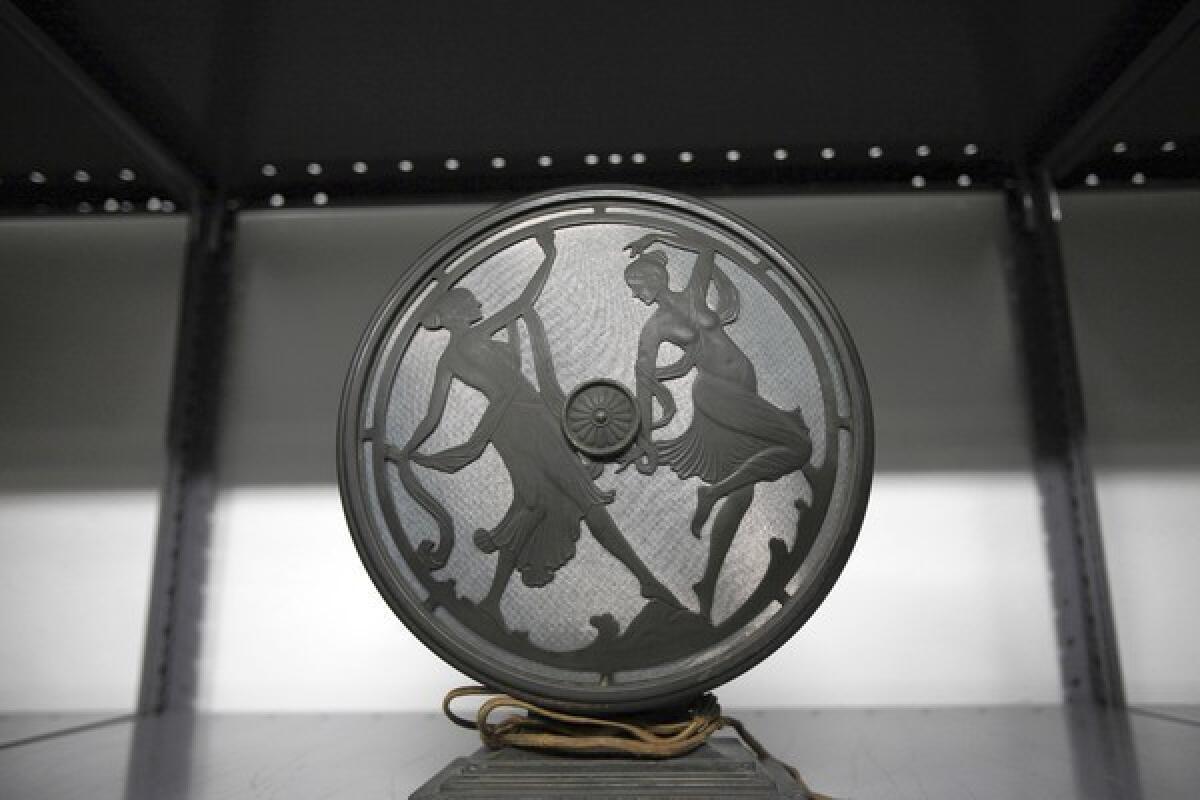Grammy Museum takes charge of music history

Deep within the high-security Iron Mountain storage facility in Hollywood, where nearly every doorway except for the restroom is protected by a security-card swipe lock, sits the Grammy Museum’s permanent collection of pop music artifacts, recordings and memorabilia.
Hundreds of 10-inch 78 rpm discs — some from Thomas Edison’s record label — reside in archival boxes on 20-foot-long metal shelves, near antique radios and phonograph players, musical instruments, posters and some celebrity fashion items stored out of sight in sturdy garment bags.
Vintage synthesizers in their original cases take up a shelf right below three distinctively different accordions, an instrument Mark Twain famously dubbed “the stomach Steinway.”
THE ENVELOPE: The Awards and industry insider
The Grammy Museum may have opened a little less than four years ago in downtown’s L.A. Live entertainment complex, but it’s already looking at myriad new ways to store and exhibit its extensive collection of music history.
“People offer to donate things, but until we had someplace to properly store and preserve them, we’ve had to turn a lot of those offers down,” executive director Robert Santelli said last Friday during a walk-through of the museum’s growing archive.
“We have to be able to safely store the items, insure them — and be sure we can make them accessible to the public at some point, because we are an educational museum,” he said. “We’re working without an acquisition budget, so we have to rely on donations.”
FULL COVERAGE: Grammy Awards
Grammy Museum assistant curator Ali Stuebner slipped on a pair of white cotton gloves to peek under the lid of a 4-foot-tall 1920s-vintage Edison phonograph resting against one of the storage space’s bunker-like concrete walls, and to show a visitor one of two old (but well cared for) piano accordions donated by squeeze-box virtuoso Ernie Felice. She later riffled through a couple of large boxes, each holding perhaps thousands of 5-by-7-inch white notecards collected from one of Yoko Ono’s wishing trees, a project for which passersby were invited to complete the thought “Imagine a world ...” in their own words and / or drawings.
It’s gems like these that caused the museum to enter into a partnership with Iron Mountain about 18 months ago, the company providing the storage space about six months later.
The Grammy Museum’s spot in the massive building is modest: It’s a repository of about 900 air-conditioned square feet, compact compared with some of Iron Mountain’s 800 other entertainment-world clients, whose holdings fill a 10,000-square-foot floor of the 14-story building.
GRAMMYS 2013: Early look at album of the year part 1 | 2
All the major record companies store master recordings made over the last 90 years here, said Iron Mountain senior vice president of entertainment services Jeff Anthony. These recordings have increasingly become a part of revenue-generating plans as new music has become ever more challenging to break.
Though movie studios, record companies, sports franchises and the USC School of Cinematic Arts also store items here, Anthony says the pairing with the Grammy Museum dovetails with his company’s mission to assist clients in digitizing their collections and, ultimately for those businesses in the private sector, making them profitable.
“It’s about monetization,” Anthony said of Iron Mountain’s for-profit clients, who have since discovered the payoff — through home video, reissues and myriad licensing opportunities — for being mindful of history.
The Grammy Museum’s own recorded history is stored at Iron Mountain but in digital form, an archive of more than 200 performances and live interviews recorded at the museum since it opened December 2008. The audio-visual archive at the museum opens to the public on Wednesday.
Beach Boys creative leader Brian Wilson was the first in a continuing string of visiting musicians that includes Ringo Starr, Stevie Nicks, Bootsy Collins, Flavor Flav, Glen Campbell, John Mayer and, yes, even the accordion-wielding king of the novelty song, “Weird Al” Yankovic.
The interviews and question-answer sessions have also included record industry veterans such as Clive Davis (for whom the museum’s 200-seat concert theater is named), former Warner Bros.-Capitol-Asylum Records executive Joe Smith, and Curb Records founder Mike Curb.
“We’ve captured more than 800 songs played and performed in the museum, and we’re at about 225 artists we’ve interviewed for these living histories,” Santelli said. “Each of these are pieces that help to tell a greater story.”
The interviews and performances have been digitized and will now be available for students, academics, journalists and everyday music fans to see and hear at the museum.
The archive is opening in conjunction with the museum’s newest exhibit, this one surveying the 125-year history of Columbia Records, a show that’s also packed with pop-music artifacts.
Among the items: a pair of Johnny Cash’s boots and his lyrics for the song “Cry, Cry, Cry”; Bob Dylan letters and lyrics; a jacket and trumpet that belonged to Miles Davis; jewelry worn by Billie Holiday; a tie and letter from Louis Armstrong; one of Barbra Streisand’s dresses; a Willie Nelson bandanna; stage sketches and lyrics from Public Enemy’s Chuck D.; one of Pete Seeger’s banjos; and a trombone played by New Orleans jazz pioneer Kid Ory.
Glancing at the boxes of old Edison 78s and the inventor’s still-functional contraption once used to play them in homes around the country, Santelli said, “Our goal is to make sure we can find all these items a good home in the museum somewhere — and to make them available for the common good.”
PHOTOS AND MORE:
PHOTOS: Iconic rock guitars and their owners
The Envelope: Awards Insider
PHOTOS: Unfortunately timed pop meltdowns
More to Read
The biggest entertainment stories
Get our big stories about Hollywood, film, television, music, arts, culture and more right in your inbox as soon as they publish.
You may occasionally receive promotional content from the Los Angeles Times.










